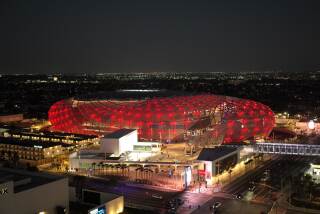At This Game, the Real Players Are in the Crowd
Standing among the lobbyists in the audience, watching them call the signals, I was in the best place to observe the plays on Wednesday as the proposed downtown sports arena won a lopsided victory in the Los Angeles City Council.
The arena advocates wore their game faces, as they say on the sports pages--intently watching the council members, making sure the lawmakers voted as they had promised.
These are the real powers in City Hall, comprising a permanent structure of inside influence, cemented by campaign contributions, friendships and knowledge of the political process.
As they had done with past big deals, the lobbyists had made their phone calls and visits to council offices, obtaining pledges of support.
Now it was time for the vote. This was too big a project to allow promises to be broken. So, just as they were supposed to do, council members voted 11-1 to begin talks with the owners of the Los Angeles Kings hockey team to build a $200-million arena, requiring at least $60.5 million in public funds, for the Kings and the basketball Lakers near the Convention Center.
*
I was especially interested in the behavior of a hyperactive-looking man in a business suit and neatly clipped beard. George Mihlsten, a partner in the mega-powerful L.A. law firm of Latham & Watkins, was coach of the team of lobbyists representing the men behind the proposal: Kings owners Philip F. Anschutz, a Denver billionaire, and Los Angeles developer Edward P. Roski.
“You look nervous,” I observed.
“I’m like Tarkanian,” he replied, invoking the name of Jerry Tarkanian, a fanatically intense college basketball coach who habitually chews on towels during games, a man so ferociously dedicated to winning that he’s called “Tark the Shark.”
Mihlsten is in charge of overall strategy, a job he’s done for such huge clients as the DreamWorks complex, MCA, Cedars-Sinai Medical Center and the proposed and controversial Pacific Pipeline underneath the city. Kings co-owner Anschutz, by the way, is a partner in the pipeline project.
If this deal goes through, Anschutz and Roski will not only be proprietors of the arena but, eventually, of an adjacent entertainment complex including a hotel, shops and movie theaters.
Assisting Mihlsten were several other lobbyists, each on the team because of their special clout with council members. Mihlsten eyed me suspiciously when I struck up conversations with the members of his team.
Occasionally, lawmakers came over to chat with various members of the lobbying team. Debate droned on. Suddenly, Francine Oschin, a council aide, approached Jan Perry, chief of staff to Councilwoman Rita Walters, a prime arena backer. Oschin’s boss, Councilman Hal Bernson, had to leave in a half-hour, Oschin said. Perry understood. The time for debate ended.
A vote was quickly taken. Only Councilman Joel Wachs voted “no.” Wachs claims to be a Lakers and Kings fan but I hope he doesn’t expect to obtain decent seats at the games.
I headed back to the paper, pondering a scene I watched with admiration and dismay.
*
Personally, I think the arena is a fine idea. Sure it’s a giveaway, but a great one, providing fun and games for a city that’s been down in the dumps for several years.
Must we immerse ourselves in gloom? Must every thought be serious, every meal healthy? Can’t we waste money on mindless spectator sports? And why not spend the money downtown, now a scary wasteland at night?
Part of me--the downtown booster and sports nut part--cheered on Mihlsten and the other lobbyists. Why shouldn’t they rush this deal through? Why do we have to be the city that doesn’t know how?
But sometimes, even a sports fan must give way to common sense.
Very few people in City Hall, including those who voted Wednesday, understand the deal. Sure, two of City Hall’s top bureaucrats, Chief Administrative Officer Keith Comrie and Chief Legislative Analyst Ron Deaton, prepared a report on the project, which I dutifully read.
As Councilman Wachs pointed out, it didn’t really answer the question of cost overruns, which have dogged almost every L.A. public project, most notably the subway. Nor did the report provide satisfactory answers to the need to replace housing for the poor families who live in the area.
State Sen. Tom Hayden, who may run against Mayor Richard Riordan, held a press conference before the vote asking for an independent audit of the plan.
Good idea. Let’s not leave the arena project entirely in the hands of the lobbyists and their lawmaker allies.
More to Read
Go beyond the scoreboard
Get the latest on L.A.'s teams in the daily Sports Report newsletter.
You may occasionally receive promotional content from the Los Angeles Times.






